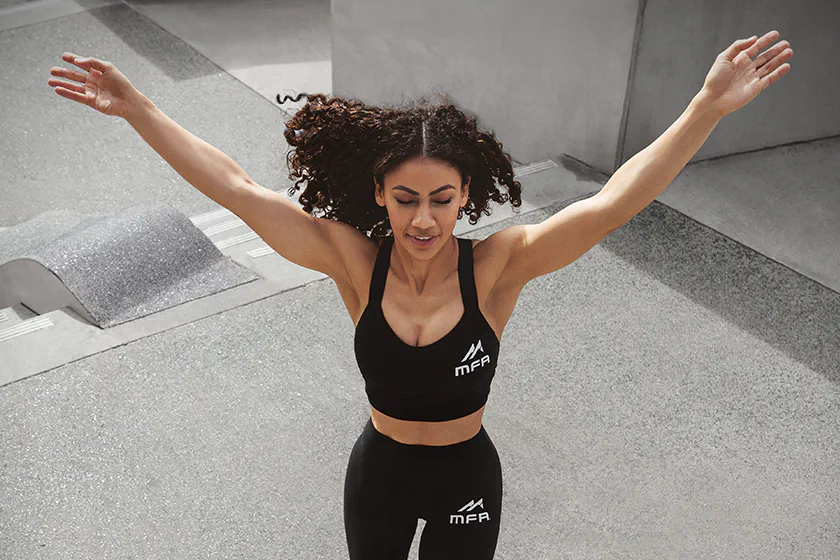The Transformative Power of Positive Thinking

How your mindset can help transform your fitness journey?
What matters most in fitness? Its physical aspects! There is no doubt about that. If you eat cleaner, run faster, and lift heavier weights, you will be healthier and, possibly, happier. The connection is straightforward. Or, so it seems.
But what happens when the exercise cycle becomes a routine, stagnation hits, and motivation runs low? Is physicality alone sufficient to overcome these challenges? The answer is no, and that’s exactly when positive thinking can make a difference between giving up halfway and pushing through a tough workout!
Luckily, there are ways to cultivate this much-needed positive mindset and reading this article is a great starting point.
What is the mind-body connection?
Everything we think and feel deeply affects our physical performance, recovery, and overall well-being. We’ve all sensed it sometimes. Unfortunately, most people are only aware of the negative side of the mind-body connection. This is the side of negative thoughts, self-doubt, decreased motivation, and poor performance.
However, mind and body are profoundly interconnected, and a positive mindset brings equally good results. Research findings suggest that it can improve immunity, reduce stress, and boost physical endurance. The trick is approaching each workout believing you are strong enough to reach your fitness goals. If you can focus on your strengths, stay consistent, push through challenges, celebrate small victories, and maintain an optimistic outlook you’ll set yourself up for success.
What science says?
We’ve all heard that challenges are opportunities for growth in life. This is true, but only with positive thinking. Without it, they become insurmountable barriers.
Now the most important part. Positive thinking is not some feel-good, mumbo-jumbo concept. It is backed by science. Studies show that optimism, for example, leads to better health outcomes. This includes:
- Improved cardiovascular health
- Lower levels of stress hormones
- Faster recovery from illness or injury
In fitness, optimism translates into motivation, which reduces perceived effort and improves focus. These are invaluable preconditions for success.
Another great example of positive thinking is the self-talk. A study published in the Psychology of Sport and Exercise*,* found that athletes who used positive self-talk performed better under pressure.
The reasons for this are simple. Not believing in yourself makes quitting more likely and easier. The opposite happens too. You’re more likely to take action and overcome obstacles while believing in your abilities. Simple and true.
How to cultivate a positive mindset?
There are ways to help you cultivate a positive mindset. Here are some practical strategies:
Practice Gratitude
It is easy to focus on the things you haven’t achieved, everything you lack in life. This will always bring negativity. But why do so when there are so many things in life to be grateful for. These could be your health, family, friends, good looks, or a special ability you might have. Focusing on these positive things instead helps cultivate motivation.
Use Positive Affirmations
If you like or want something, stop telling yourself it’s impossible. No matter how distant it may seem. For example, saying “I could never run a marathon.” does not benefit you. Positive affirmations work much better, even if they talk about smaller things. Try telling yourself, “I am improving. I am more capable than before. or I’m stronger.”
Set Realistic Goals
Motivation is invaluable for success. To remain motivated, you need occasional wins. Setting unrealistic (too big) goals can make you wait too long for the win, and time is the enemy of motivation and determination. It’s better to set small, achievable milestones, and celebrate small wins often!
Surround Yourself with Positivity
Your mindset is affected by people around you. Make sure to surround yourself with positive and supportive friends, workout buddies, trainers, etc. Positivity is contagious!
Reframe Challenges
You missed a workout? No problem! Rest and recovery are crucial for success. It’s all part of the same process, so don’t beat yourself down. You’ll only come back stronger for the next workout.
Visualize Success
Visualization is a powerful technique used by some of the most successful athletes in sports history. It reinforces positive beliefs and prepares the mind for success. So, take some time to imagine yourself achieving your goals. It’s worth it.
Focus on Progress
Do not chase perfection, only progress. It is important to notice small improvements, both in life and the fitness routine. Fitness is a journey, not a destination.
How to overcome negativity?
If maintaining a positive mindset was easy, there would be no need for guidance. However, we all know that life is full of ups and downs. So, there are plenty of opportunities for negativity. That means we need to remain watchful. The ability to recognize those negative thinking moments is crucial so that we can take proactive steps and shift the mindset to positive thoughts. Here are some tips to overcome negativity:
- Acknowledge your feelings. It is normal to feel frustrated occasionally. The same applies for discouragement and disappointment. The best thing to do is acknowledge these emotions and take steps to move away from them.
- Challenge negative thoughts. Always question them. If you love yourself and you feel hurt, for example, ask yourself if you are possibly exaggerating or distorting the issue that is causing negativity. Try for a more positive outlook.
- Practice self-compassion because setbacks happen! Treat yourself like you do the ones you care about, with plenty of understanding and kindness.
The Final Word
The power of positive thinking extends beyond fitness. It is a life-changing ability that helps you achieve your fitness goals and enables you to enjoy along the way. We’ve said already that fitness is mostly about physical ability. However, it is also about mental strength. Therefore, by cultivating your mindset, you will enhance your physical performance.
The next time you go for a workout, check in first with your thoughts. For a moment, allow yourself to feel if they are lifting you or holding you back. Eliminate negativity and let the power of positive thinking transform your fitness journey - and your life.
References:
- Littrell, J. (2008). The mind-body connection: not just a theory anymore. Social work in health care, 46(4), 17-37.
- Levine, G. N., Cohen, B. E., Commodore-Mensah, Y., Fleury, J., Huffman, J. C., Khalid, U., … & American Heart Association Council on Clinical Cardiology; Council on Arteriosclerosis, Thrombosis and Vascular Biology; Council on Cardiovascular and Stroke Nursing; and Council on Lifestyle and Cardiometabolic Health. (2021). Psychological health, well-being, and the mind-heart-body connection: a scientific statement from the American Heart Association. Circulation, 143(10), e763-e783.
- Van Raalte, J. L., Vincent, A., & Brewer, B. W. (2016). Self-talk: Review and sport-specific model. Psychology of Sport and Exercise, 22, 139-148.
- Emmons, R. A., & Stern, R. (2013). Gratitude as a psychotherapeutic intervention. Journal of clinical psychology, 69(8), 846-855.
- Hall, N. C., & Sverdlik, A. (2016). Encouraging realistic expectations in STEM students: Paradoxical effects of a motivational intervention. Frontiers in Psychology, 7, 1109.
- Predoiu, R., PREDOIU, A., MITRACHE, G., FIRĂNESCU, M., COSMA, G., DINUŢĂ, G., & BUCUROIU, R. A. (2020). VISUALISATION TECHNIQUES IN SPORT-THE MENTAL ROAD MAP FOR SUCCESS. Discobolul-Physical Education, Sport & Kinetotherapy Journal, 59(3).
- Shepherd, D. A., & Cardon, M. S. (2009). Negative emotional reactions to project failure and the self‐compassion to learn from the experience. Journal of Management Studies, 46(6), 923-949.
Dr. Rosmy Barrios is a physician specializing in regenerative and aesthetic medicine. She serves as the Medical Director of the Regenerative Medicine Department at P.A.R.K.S Clinic. With over a decade of international experience, Dr. Barrios focuses on anti-aging therapies, cellular regeneration, and holistic wellness. She is also a published health writer and advisor, contributing to platforms like Forbes and Yahoo Health, and is a member of several global aesthetic medicine associations.


